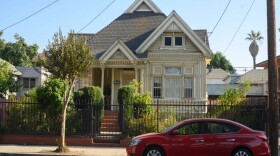RENEE MONTAGNE, host:
This is MORNING EDITION from NPR News. I'm Renee Montagne.
It's been said that the East End of London is the most diverse place on the planet. People there speak more than 130 languages - testimony to the British government's policy of allowing immigration from every corner of the globe. Now, though, a debate is raging in the East End borough of Newham over the construction of what would be the largest mosque in Europe, just beside the proposed main stadium for the 2012 Olympic games.
It's part of a larger debate about Islam and its place in British society, as Rob Gifford reports.
Mr. ALAN CRAIG (Christian Peoples Alliance): We're standing here right by - this here is the mosque site, and of course this is right beside one of the main access points into the 2012 Olympic stadium.
ROB GIFFORD: Alan Craig gives a guided tour of a derelict stretch of industrial wasteland near his home. It's here that an Islamic group has bought a large patch of land and is about to submit a planning application to build a mosque that will hold 12,000 worshippers.
Craig is a member of a small local party called the Christian Peoples Alliance. He says he's not opposed to mosques or Muslims, but he is opposed to this Islamic group specifically. It's called Tablighi Jamaat. It's fully legal in Britain and describes itself as a Muslim revivalist missionary group.
Mr. CRAIG: They are a very separatist, isolationist sect. They're very secretive and they teach their followers to separate, to dismiss and disparage indigenous society, you know, Western society. There is no doubt whatsoever that while they claimed that they're not political, they're not violent and so on, they do believe in and accept jihad. A number of young men have been through Tablighi Jamaat and then have ended up involved in alleged or actual atrocities.
GIFFORD: Specifically, says Craig, one of the suicide bombers on the London transport system on July 7th, 2005 attended a Tablighi Jamaat mosque in Yorkshire, and two of the men who drove a blazing jeep into Glasgow Airport this past July had links to Tablighi Jamaat.
Craig is not the only who's opposed to the group building the mosque. Some local Muslim groups have also expressed concerns. And waiting on a taxi rink nearby, local residents Gary Thomas and another driver who didn't want his name used both felt the mosque shouldn't be built.
Mr. GARY THOMAS: You're talking (unintelligible) there's talk about it. (Unintelligible) have another bigger one (unintelligible)
Unidentified Man: So many mosques, everywhere there's mosque, why should they have a massive one like that? Why? They took over Christian churches now. They take over everything. Why?
GIFFORD: Tablighi Jamaat has a general policy of not speaking to the media, but in a video clip posted earlier on YouTube, their spokesman, Abdul Rashid Bhatti, rejected the accusation that Tablighi Jamaat is either secretive or extremist.
Mr. ABDUL RASHID BHATTI (Spokesman, Tablighi Jamaat): The whole thing behind Tablighi Jamaat is to welcome all schools of thought which encompass Islam, and on the other aspect with the non-Muslim, we welcome every faith. So everybody's welcome, and this is really a bridge between all communities.
GIFFORD: Bhatti says Tablighi Jamaat does not condone any kind of violence. Though there is plenty of opposition to the mosque, there are also many in the East End such as Nashin Hussein(ph) and Robin Patten(ph) waiting outside Stratford underground station nearby who see no problem as long as there are no extremist links.
Ms. NASHIN HUSSEIN: If there's no proof of that, and they're just trying to build a mosque just for the sake of building a mosque, you know, just for the sake of people going to be able to worship, then I guess it's okay.
Ms. ROBIN PATTEN: If they're not causing no trouble, you can't do anything. They're not doing nothing wrong, are they. So live and let live (unintelligible) yeah.
GIFFORD: All of this furor has blown up even before a formal application for construction of the mosque has been submitted to the local authorities. That's expected by the end of the year; then the battle will really begin.
Rob Gifford, NPR News, London. Transcript provided by NPR, Copyright NPR.






